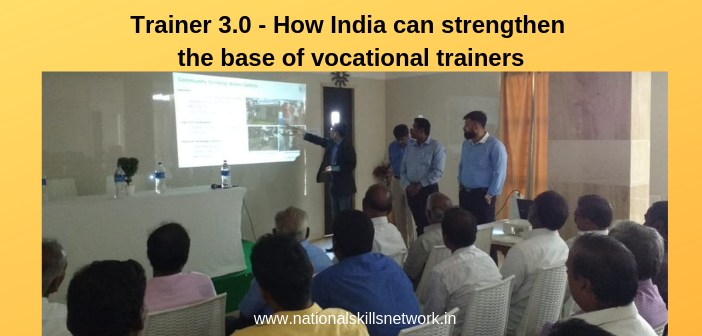
Training can no longer be left to the training department! On a positive note, today, many can take up the role of a vocational trainer, irrespective of their formal qualifications. In a world completely taken over by social, local and mobile (So-Lo-Mo) technologies anyone who has knowledge, experience and skills in a specific domain, can contribute to training and workplace learning. It could be a peer, a supervisor, a manager or even some one outside the professional arena. At the same time, the world of trainee is also changing since he or she can learn from many sources, as and when needed without depending on the formal training session.
For example, take the case of Abhinav, a senior trainer in an automotive academy that imparts vocational skills. After 12 years of experience in various roles in auto service industry, he joined the academy to train youth. He couldn’t satisfy his passion just by training in the classroom, he also created a YouTube channel in local language by making videos of practical sessions. He wanted to share his knowledge with more and more learners and his students started watching the videos to refresh their knowledge. They were happy they could watch their trainer repeatedly or as an when they needed. With thousands of views in a month the channel became quite popular among the automotive students. Since Abhinav was aware of the NSQF and QP-NOS, all his videos were planned as complementary learning content for certain levels.
In a totally different context, Seema, a supervisor in a Sewing Center discovered her hidden talent in training when she had to help one of the employees in using the computer for entering a consignment details. Though her core skills were into operating a sewing machine, she acquired computer skills on her own when she was promoted as a supervisor and now she was happy sharing her knowledge with others.
Trainees such as Govind and Murali, both undergoing advanced training in construction, are mostly seen discussing their queries with their friends in the class. Such peer interaction has helped many in learning from the classmates and solving the problems together through exploration or trial and error. The peers generally made up for the trainer who, in most cases, did not have latest knowledge about the subject. For practicals, the site supervisor doubled up as a trainer for the hands-on sessions in the real work environment.
Strengthening the base of vocational trainers through Training 3.0 approach
Going by the above examples, is the role of a vocational trainer certified by the Sector Skill Council going to be redundant? What do they prepare themselves to face the emerging challenges of Training 3.0 that happens anywhere, anytime? Alternatively, those who are not formally qualified trainers like we saw in the above cases, should they get certified?
Questions such as these can be answered in three ways:
Pedagogy : Those who take up training as a passion or interest could perform better when they are equipped with pedagogic skills for being effective and impacting more. Paying attention to the learning process, learning styles and methodology can help them in organizing their session in a better way. They can also get initiated into how their interventions can align with NSQF curriculum requirements, as per the NOS for a particular job role.
Learner focus: The changing world of trainees is best understood by studying the impact of So-Lo-Mo technologies on learning that is self-initiated or just-in-time. With innumerable channels to receive information and knowledge, the trainees need to access relevant content that meets their need. The role of a trainer becomes important in sifting grain from the chaff so that the learner get access to the right learning content to deliver the expected outcomes.
Continuous learning: If trainers are not able to keep themselves updated, they will become redundant in the constantly evolving world of work. In addition to organized ToT sessions, the trainers should interact with the industry and gain latest know-how to stay relevant, besides understanding their expectations. Building a rapport with the industry through workshops and similar events could give them insights into how training is linked with on-the-job performance, productivity, outcomes and quality at the workplace.
The convergence of technologies, combined with passionate individuals who wish to a make a change could address issues with shortage of vocational trainers in India. The number SSC qualified trainers has to be increased by co-opting part time trainers and subject matter experts who can build a huge resource pool in every industry sector. We can’t afford to restrict ourselves to traditional training methods and the physical presence of a trainer in the classroom. Training 3.0 is all about going beyond and unlike anything before in supporting performance on the job.













Comments 1